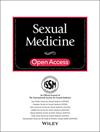Sexual experiences and information needs among patients with prostate cancer: a qualitative study
IF 2.6
3区 医学
Q1 MEDICINE, GENERAL & INTERNAL
引用次数: 0
Abstract
Abstract Background Less is known about the sexual life and information seeking of Chinese patients with prostate cancer (PCa) after androgen deprivation therapy (ADT) treatment. Aim To identify the experiences of sex and information needs among Chinese patients with PCa after ADT treatment. Methods This qualitative study included 15 Chinese patients with PCa in urology inpatient wards, selected via a purposive sampling method. Semistructured interviews were conducted face-to-face or by telephone regarding sexual experiences and information needs after ADT treatment. Outcomes Themes and subthemes were assessed among patients with PCa. Results Two themes and 5 subthemes emerged from the interview data. The first theme was “altered sexual life and attitude” with 3 subthemes: (1) undesirable sexual function and altered sexuality, (2) sexual attitudes and sociocultural cognition, and (3) behavior adjustment and intimacy. The second theme was “scarce information sources” with 2 subthemes: (1) uncertainty and lack of information support and (2) barriers to access sexual information. Clinical Implications The present findings suggest that the following may help patients with PCa manage treatment and develop appropriate sexual attitudes: a tailored sexual health education program, well-equipped consultations rooms, and information delivery innovations. Strengths and Limitations Strengths of this study included adding unique evidence among patients with PCa within an Asian context to reveal the understudied topic of sexual health and information needs after ADT treatment. This study was limited in being representative of all Chinese patients with PCa, with different marital statuses, treatment therapies, sexual orientations, and barriers of information seeking. Conclusion Sexual life and attitude among patients with PCa were affected by their sociocultural cognition and ADT treatment, and most patients received insufficient information and sexual health education from health care providers.前列腺癌患者的性经历和信息需求:一项定性研究
摘要 背景 对中国前列腺癌(PCa)患者接受雄激素剥夺疗法(ADT)治疗后的性生活和信息需求知之甚少。目的 了解中国前列腺癌患者在接受 ADT 治疗后的性生活经历和信息需求。方法 本定性研究通过目的性抽样方法,在泌尿科住院病房中选取了 15 名中国前列腺癌患者。就 ADT 治疗后的性经历和信息需求进行了面对面或电话的半结构化访谈。结果 对 PCa 患者的主题和次主题进行了评估。结果 从访谈数据中发现了两个主题和五个次主题。第一个主题是 "性生活和态度的改变",包含 3 个子主题:(1) 不理想的性功能和性生活的改变;(2) 性态度和社会文化认知;(3) 行为调整和亲密关系。第二个主题是 "信息来源匮乏",包含 2 个子主题:(1) 不确定性和缺乏信息支持;(2) 获取性信息的障碍。临床意义 本研究结果表明,以下几点可以帮助 PCa 患者管理治疗和培养适当的性态度:量身定制的性健康教育计划、设备齐全的咨询室和信息提供创新。本研究的优点和局限性 本研究的优点包括为亚洲 PCa 患者提供了独特的证据,揭示了 ADT 治疗后性健康和信息需求这一研究不足的话题。本研究在代表所有中国 PCa 患者方面存在局限性,这些患者的婚姻状况、治疗方法、性取向和信息寻求障碍各不相同。结论 PCa 患者的性生活和性态度受到其社会文化认知和 ADT 治疗的影响,大多数患者从医护人员那里获得的信息和性健康教育不足。
本文章由计算机程序翻译,如有差异,请以英文原文为准。
求助全文
约1分钟内获得全文
求助全文
来源期刊

Sexual Medicine
MEDICINE, GENERAL & INTERNAL-
CiteScore
5.40
自引率
0.00%
发文量
103
审稿时长
22 weeks
期刊介绍:
Sexual Medicine is an official publication of the International Society for Sexual Medicine, and serves the field as the peer-reviewed, open access journal for rapid dissemination of multidisciplinary clinical and basic research in all areas of global sexual medicine, and particularly acts as a venue for topics of regional or sub-specialty interest. The journal is focused on issues in clinical medicine and epidemiology but also publishes basic science papers with particular relevance to specific populations. Sexual Medicine offers clinicians and researchers a rapid route to publication and the opportunity to publish in a broadly distributed and highly visible global forum. The journal publishes high quality articles from all over the world and actively seeks submissions from countries with expanding sexual medicine communities. Sexual Medicine relies on the same expert panel of editors and reviewers as The Journal of Sexual Medicine and Sexual Medicine Reviews.
 求助内容:
求助内容: 应助结果提醒方式:
应助结果提醒方式:


